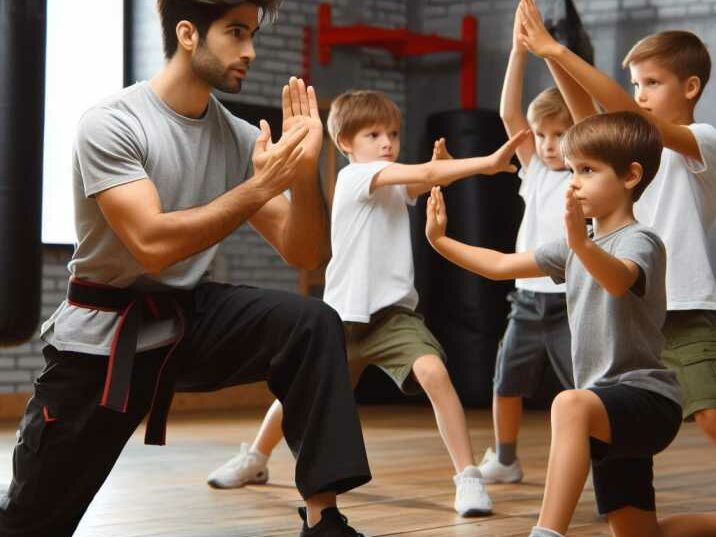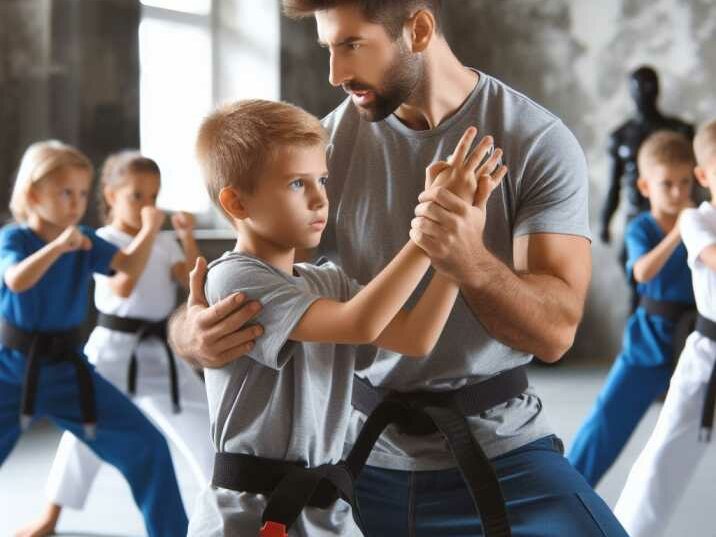Introduction:
Table of Contents
In recent years, the interest in martial arts among children has soared. Parents are increasingly considering various forms of martial arts, not just for self-defense but also for the numerous benefits they offer in terms of physical fitness, discipline, and confidence. One such martial art gaining popularity, particularly in the United States, is Krav Maga. But the question arises: Can children learn Krav Maga? Let’s explore the possibilities, benefits, and considerations.

Can Children Learn Krav Maga?
Can children learn Krav Maga? Absolutely! Let’s delve into how this dynamic martial art provides youngsters with essential self-defense skills while also boosting their confidence.
Benefits of Children Learning Krav Maga:
Increased Confidence:
Krav Maga instills a sense of confidence in children by teaching them practical self-defense techniques. As they master these techniques, they become more self-assured, which can positively impact various aspects of their lives.
Improved Physical Fitness:
Krav Maga is a high-intensity workout that combines elements of boxing, wrestling, and martial arts. Through regular practice, children can improve their strength, agility, and cardiovascular health.
Enhanced Focus and Discipline:
Learning Krav Maga requires focus and discipline. Children are taught to pay attention to their surroundings and react quickly to potential threats. This focus translates to other areas of their lives, such as academics and extracurricular activities.
Self-Defense Skills:
In today’s world, knowing how to defend oneself is essential. Krav Maga equips children with practical self-defense skills that they can use to protect themselves in real-life situations.
Improved Mental Resilience:
Krav Maga teaches children to remain calm under pressure and to think strategically in challenging situations. This mental resilience can help them navigate various challenges they may encounter in life.
Considerations for Children Learning Krav Maga:
Age Appropriateness:
While children as young as five or six years old can begin learning basic Krav Maga techniques, the intensity of the training may not be suitable for all age groups. It’s essential to consider the child’s maturity level and physical capabilities before enrolling them in Krav Maga classes.
Safety Measures:
Safety should always be a top priority when teaching Krav Maga to children. Certified instructors should emphasize the importance of proper technique and provide a safe learning environment free from hazards.
Parental Involvement:
Parents should be actively involved in their child’s Krav Maga journey. This includes researching reputable instructors and academies, attending classes with their child, and reinforcing the principles taught in class at home.
Balancing Other Activities:
Krav Maga can be physically demanding, so it’s essential to ensure that children have a balanced schedule that includes time for rest, homework, and other extracurricular activities.
Emphasis on Self-Defense, Not Aggression:
It’s crucial to teach children that Krav Maga is primarily for self-defense and not for initiating violence. Emphasizing the importance of using their skills responsibly is key to fostering a positive and safe learning environment.
Conflict Resolution Skills:
Krav Maga not only teaches physical self-defense but also emphasizes conflict resolution and de-escalation techniques. Children learn how to assess situations and diffuse conflicts peacefully whenever possible.
Teamwork and Cooperation:
Many Krav Maga classes incorporate partner drills and group exercises, fostering a sense of teamwork and cooperation among children. Learning to work together with classmates towards a common goal can be invaluable for their social development.
Stress Relief:
Like many forms of exercise, Krav Maga can serve as a stress reliever for children. The physical activity and focus required during training can help them release pent-up energy and tension, promoting overall mental well-being.
Adaptability and Problem-Solving:
Krav Maga is not a rigid martial art with set forms or katas. Instead, it teaches children to adapt to different situations and think on their feet. This flexibility and problem-solving ability can be beneficial both on and off the training mat.
Character Development:
Krav Maga emphasizes core values such as respect, perseverance, and integrity. Through consistent practice and adherence to these values, children can develop into well-rounded individuals with strong character traits.
Considerations for Parents:
Cost of Classes:
Krav Maga classes for children may vary in cost depending on the location, instructor credentials, and facilities provided. Parents should consider the financial commitment involved and ensure it aligns with their budget.
Equipment Needs:
While some Krav Maga academies may provide equipment such as gloves and pads, others may require parents to purchase them separately. It’s essential to inquire about any necessary equipment and its cost before enrolling a child in classes.
Certification and Accreditation:
Parents should verify that the Krav Maga instructor and academy are certified and accredited by reputable organizations. This ensures that the instruction meets high standards of quality and safety.
Long-Term Commitment:
Learning Krav Maga is a journey that requires dedication and perseverance. Parents should discuss with their child the importance of committing to regular practice and attending classes consistently.
Physical Requirements:
While Krav Maga can be adapted to accommodate different fitness levels, parents should be aware of any physical limitations their child may have. Communicating these limitations to the instructor can help tailor the training program accordingly.
Advanced Training Opportunities:
For children who show exceptional dedication and skill in Krav Maga, there are often opportunities for advanced training. This may include specialized classes focusing on advanced techniques, sparring sessions, or participation in tournaments and competitions. Advanced training can further enhance a child’s proficiency in Krav Maga and provide them with a sense of achievement and recognition for their hard work.
Community Engagement and Outreach:
Many Krav Maga academies actively engage with the community by organizing seminars, workshops, and outreach programs. These events may focus on topics such as bully prevention, self-defense for children with special needs, or empowering young girls and women through self-defense training. Participating in community events not only benefits children by expanding their skills but also reinforces the values of empathy, compassion, and social responsibility.
Cross-Training Opportunities:
While Krav Maga is a highly effective self-defense system on its own, some children may choose to complement their training with other martial arts or physical activities. Cross-training in disciplines such as Brazilian Jiu-Jitsu, Muay Thai, or gymnastics can provide additional benefits such as improved flexibility, agility, and tactical knowledge. Encouraging children to explore different martial arts can broaden their horizons and deepen their understanding of self-defense principles.
Educational Workshops:
In addition to physical training, many Krav Maga academies offer educational workshops covering topics such as situational awareness, personal safety, and conflict resolution. These workshops provide children with valuable knowledge and strategies for staying safe in various real-life scenarios, whether at school, in public spaces, or online. Empowering children with information and practical skills to navigate potentially dangerous situations can significantly enhance their overall safety and well-being.

Table of information
| Topic | Details |
|---|---|
| Introduction | Exploring Can children learn Krav Maga? and the reasons behind its growing popularity. |
| Benefits of Children Learning Krav Maga | Increased Confidence – Improved Physical Fitness – Enhanced Focus and Discipline Self-Defense Skills Improved Mental Resilience |
| Considerations for Children Learning Krav Maga | Age Appropriateness Measures Parental Involvement Balancing Other Activities Emphasis on Self-Defense, Not Aggression |
| Additional Information | Conflict Resolution Skills Teamwork and Cooperation Stress Relief Adaptability and Problem-Solving Character Development |
| Advanced Training Opportunities | Specialized Classes Community Engagement and Outreach Cross-Training Opportunities Educational Workshops |
| Conclusion | Summarizing the benefits of children learning Krav Maga and the importance of informed decision-making for parents. |
Conclusion:
In conclusion, Can children learn Krav Maga? Children can indeed learn Krav Maga, reaping numerous benefits such as self-defense skills, improved fitness, and enhanced mental resilience. However, parents must consider factors like safety, parental involvement, and long-term commitment before enrolling their child. With proper guidance and support, Krav Maga can empower children with confidence and valuable life lessons that extend beyond the training mat.
FAQs (Frequently Asked Questions):
1. Can children of any age learn Krav Maga?
- Yes, children as young as five or six years old can start learning basic Krav Maga techniques under the guidance of certified instructors.
2. Is Krav Maga safe for children?
- When taught by qualified instructors in a controlled environment, Krav Maga can be safe for children. Emphasis should be placed on proper technique and safety measures.
3. Will learning Krav Maga make my child more aggressive?
- No, Krav Maga teaches children to defend themselves responsibly and emphasizes avoiding confrontation whenever possible.
4. How often should children practice Krav Maga?
- The frequency of practice depends on various factors, including the child’s age, fitness level, and goals. Typically, children may attend classes two to three times per week.
5. Can Krav Maga help my child build confidence?
- Yes, learning Krav Maga can boost children’s confidence as they master self-defense techniques and overcome challenges in a supportive environment.


